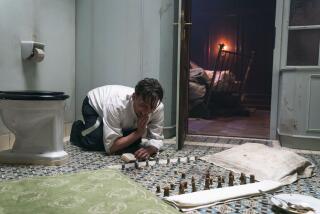Fischer Gambits Familiar as ‘Revenge Match’ Starts Up : Yugoslavia: The quirky American chess master spits on a U.S. government letter warning against the event.
- Share via
SVETI STEFAN, Yugoslavia — On the question of how far some people will go for money, the answer may be this Adriatic island fortress off the coast of Montenegro.
A Serbian businessman bent on buying respectability for his scorned and isolated homeland has tossed out $5 million in prize money to lure temperamental American chess master Bobby Fischer out of self-imposed seclusion into new disrepute.
Fischer and Russian Boris Spassky, Cold War-era antagonists of 20 years ago, face each other over the chess board in an exhibition match beginning today that is immodestly called by its hucksters “The Revenge Match of the 20th Century.”
At their fractious and politically charged match in Reykjavik, Iceland, 20 years ago, Fischer and Spassky riveted world attention as they fought for the world championship of chess. Fischer won, 12 1/2 points to 8 1/2, but was stripped of the title three years later when he refused to defend it against Anatoly Karpov of the Soviet Union, who became world champion as a result. Fischer then disappeared from public view, living, it was thought, in the Pasadena area.
But now, with the guns of ethnic warfare blazing less than 50 miles away, foreign governments shouting “genocide” over mounting reports of Serbian atrocities and no sign from the World Chess Federation that the match is considered anything but an ill-timed commercial stunt, the usual entourage of grandmasters and expert commentators have declined to dignify the censured spectacle with their attendance.
Perhaps because of the U.N. sanctions that have severed most financial and transport ties to Yugoslavia, the competitors replaying the greatest of all grudge matches have been followed here by few other chess luminaries aside from their respective seconds and one foreign referee.
“One must bear in mind that, geographically, we are situated only 70 or 80 kilometers away from a war zone,” observed match director Janos Kubat, explaining the no-shows.
No matter, says the sponsor, Yugoslav banker Jezdimir Vasiljevic, whose mysteriously accumulated millions bankrolled a garish opening ceremony Tuesday atop the stone ramparts of the fortress here.
Although assured of at least a third of the lucrative match pot put up by Vasiljevic, Fischer seemed determined to make the sponsor of his ballyhooed comeback live to regret it.
Breaking global sanctions against Yugoslavia for its role in the ethnic slaughter in Bosnia-Herzegovina, Fischer used the first day of his oddly timed re-emergence to fight over every detail of his participation. He also managed, in less than 30 minutes, to insult the U.S. government, communism, Israel, Jews, the global press and the entire chess world of the former Soviet Union.
Ever the enfant terrible, even at age 49, Fischer outdid his own standards for outrageous behavior even before the first chess piece has been moved.
Asked about a U.S. government threat to prosecute him for sanctions-busting, Fischer hauled up a battered brown briefcase and pulled out a long facsimile letter sent by the U.S. Treasury Department. It warned that he could face fines up to $250,000 and 10 years in jail for “trading with the enemy” by selling his name and notoriety for Yugoslavia’s benefit.
“This is my reply to the order not to defend my title here,” Fischer said, clearing his throat and spitting on the letter.
Fischer was asked if he supports the embargo. “No, I don’t support the sanctions because first of all I don’t support the U.N.,” he said.
“For example, look at Israel. There has been resolution after resolution against them for them to leave the West Bank and so on,” Fischer said. “They ignore resolutions and never have sanctions against them.” Fischer also objected to the United Nations’ rescinding of its resolution equating Zionism with racism.
To another question, he said communism was “basically a mask for Bolshevism, which is a mask for Judaism.”
At the evening ceremony featuring a small army of dancers and singers in medieval garb and fireworks that made foreign guests in this heavily militarized republic more nervous than entertained, Fischer insisted he be allowed to play the white pieces, thus gaining the advantage of the first move, rather than submit to a drawing that would have given Spassky an even chance to start the first game.
“No, no, no. Under my rules there is no drawing of lots,” Fischer insisted, prompting one nearby spectator to comment, “I see the brat is back.”
Miffed by the stubborn Fischer, the host eventually turned to the more genteel Spassky, who then lost the draw, giving Fischer the first move in today’s game.
Fischer grudgingly attended a press conference, but only on condition that all questions be submitted in writing and that he be allowed to sort through them.
He repeatedly accused reigning world chess champion Gary Kasparov and other ex-Soviet players of rigging matches and cheating, calling Kasparov among “the lowest dogs around.” Yet Fischer allowed as how he would like to defend his tarnished world title some time in the future, presumably against Kasparov.
Among his more bizarre statements, Fischer at one point suggested chess could be saved from the corruption of computers if players would randomly shuffle the starting position of the pieces to “get rid of all the theory.”
For reasons of principle and profit, not necessarily in that order, Spassky has agreed to the challenge by an adversary whose tantrums 20 years ago helped define their contest as a surrogate clash of the superpowers.
Asked why he chose to ignore foreign prohibitions against ventures enriching Yugoslavia, Spassky replied only that he is a professional chess player.
“In the interest of the chess world, this match is really important,” said the silver-haired Russian, who now lives in France. “This match is very good politics for chess, and maybe not only for chess.”
What little moral high ground exists at this publicized ploy of Vasiljevic’s has been occupied by the 55-year-old Spassky, who has sat aside quietly during Fischer’s tirades.
In contrast with their incessant bickering and traded charges of spying and harassment in 1972, Fischer and Spassky seem to have settled into a more congenial relationship, or perhaps the latter has lost the will to fight.
When asked why he was preempting the right to set all match conditions, from playing table dimensions to an experimental time-keeping formula to a prohibition against adjourned games, Fischer suggested that Spassky appreciated the special measures he arranged for them both.
“Boris likes to play with me because he knows I’ll take care of him,” Fischer said. Spassky appeared to nod agreement.
The two players have spent the past week studying, Fischer in seclusion with his seconds in a heavily guarded stone villa while Spassky was occasionally seen strolling about town with his tanned and elegant wife.
A 19-year-old Hungarian chess star accompanying Fischer has kept tout le monde of chess and gossipy locals eager for a glimpse of the reclusive pair. But Zita Rajcsanyi has been spotted only at Fischer’s high-security press conference and at the island-top gala where she sat at a regally decked head table, looking the part of a wide-eyed teen thrust into the limelight.
How long the depleted cast will stay and play at Sveti Stefan depends on when either of the competitors takes five games. Then the match moves to Belgrade until one of the players wins the contest by accumulating a total of 10 wins during the four-times-a-week play.
What will the poor and jobless Montenegrins do with the mountain of unsought souvenirs Vasiljevic produced, most of them bearing his own likeness more prominently than that of either of the players?
“We’re not worried. The games will last months,” said Slobodan Adzic as he unpacked a shipment of bootleg Bobby Fischer tennis shoes to add to the badges, postcards and T-shirts drawing little attention on opening day.
What will the players do with their winnings, if both persevere through tense weeks of competition that has previously brought out their worst?
Spassky said he would pursue more vigorously what is already semi-retirement, while Fischer gave an answer impossible to judge as sarcastic or sincere.
“Maybe I’ll get a Mercedes-Benz,” Fischer said, “a few little toys like that.”
More to Read
Sign up for Essential California
The most important California stories and recommendations in your inbox every morning.
You may occasionally receive promotional content from the Los Angeles Times.














